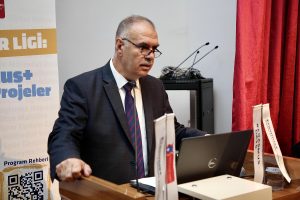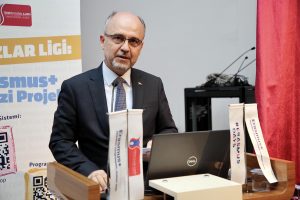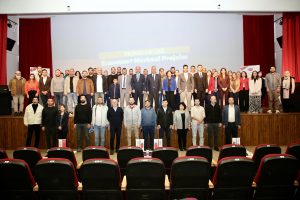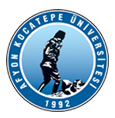Afyon Kocatepe University (AKU) International Relations Application and Research Center (UIM) organized the “Stars League 2025: Erasmus+ Centralised Projects Meeting.”
The meeting, held at the İbrahim Küçükkurt Conference Hall, was attended by AKU Vice Rector Prof. Dr. Şuayıp Özdemir, Turkish National Agency General Coordinator Sefa Yahşi, UIM Director Assoc. Prof. Dr. Volkan Yüncü, along with academic and administrative staff.
“These programmes are not limited to mobility activities”
In his opening remarks, AKU Vice Rector Prof. Dr. Şuayıp Özdemir stated that they convened to evaluate centralised projects, one of the most prestigious components of the Erasmus+ programme. Emphasizing that the Erasmus+ scheme implemented by the Turkish National Agency is not limited to mobility activities in higher education, Prof. Dr. Özdemir highlighted that Erasmus+ contributes significantly to knowledge production, policy development, and sustainable transformation processes. “Since the very first day Afyon Kocatepe University joined the Erasmus+ programme, we have been part of this process not only through student and staff exchanges but also through projects that enhance institutional capacity and support innovative collaborations,” he said.
“Our universities are becoming active stakeholders of the global knowledge ecosystem”
Prof. Dr. Özdemir noted that Afyon Kocatepe University has, to date, established a strong model of internationalization with more than 160 active Erasmus agreements and eight different consortium partnerships, most of which it leads. He indicated that centralised projects represent the visionary dimension of this model.
“Initiatives such as Teacher Academies, Jean Monnet Activities, and Capacity-Building Projects are strategic fields that can shape not only the future of our institutions but also of our national education system. Through these projects, our academics participate in policy development processes in Europe, and our universities become active stakeholders in the global knowledge ecosystem,” he said. Prof. Dr. Özdemir expressed his belief that the meeting would facilitate both the sharing of existing experiences and the emergence of new project ideas, adding: “On behalf of our university, I extend my gratitude to the Turkish National Agency and all contributors, and I wish everyone a productive and inspiring meeting.”
“50,000 citizens benefit from grants”
Turkish National Agency General Coordinator Sefa Yahşi stated that the Agency has been operating since 2004 and that each year, a total of 50,000 citizens benefit from Erasmus+ and European Solidarity Corps programme grants. Emphasizing the use of an annual budget of 170 million euros, Yahşi said: “This amount, equivalent to 8 billion TL, is formed from the taxes we pay to the European Union, contrary to what many believe. Therefore, its use is of great importance.”
Providing information on Centralised Projects, Yahşi continued: “Applications for Centralised Projects are submitted directly to the central executive agency in Brussels. These high-budget and prestigious projects start from 25,000 euros in grants and may exceed several million euros.”
“We want the budget to increase four- or fivefold”
Yahşi stated that Turkey contributes 15 million euros each year to the EU’s 920 million-euro Centralised Projects budget. “Unfortunately, we are not able to reclaim the full amount we invest. The portion we cannot utilise ends up financing the projects of other countries. We want the amount we invest and the amount we use to increase by four to five times,” he said.
He emphasized that insufficient project applications from Turkey result in funds supporting projects in other countries: “Countries like Germany and France receive much more than what they contribute. Therefore, we expect you to apply for centralised projects and bring back far more funding to Turkey than we invest.”
Following the opening speeches and the group photo, presentations were delivered on several topics, including Erasmus+ Centralised Projects, Teacher Academies Policy Priorities, Technical Information and Sample Projects, Teacher Academies: AI Literacy, Jean Monnet Activities Policy Priorities, and Jean Monnet and Capacity-Building Projects Policy Priorities.
The meeting concluded after the general evaluation session.




